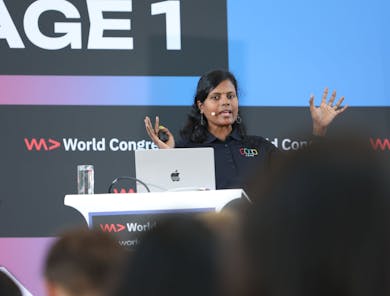The tech industry in Europe is hugely diverse, with an incredible variety of tech-related roles available across the continent, significant ranges in salary and culture, and of course, location.
We decided to help our community find their next role more easily by analysing our jobs data, and seeing what it tells us about the state of the tech jobs market in Europe in 2025.
Full Stack Developers: In High Demand, with Strong Salaries
There’s one role that stands out ahead of all others when it comes to finding the most common job listed in our data: Full Stack Developer.
Surprisingly, jobs listings for Full Stack Developers are way more common than those looking for just frontend, or just backend. Perhaps it’s a sign that development has fundamentally changed, with tools like frameworks blurring the distinction between frontend and backend, it’s fair to assume that most developers straddle the line between the two, to some degree, if they are not officially full stack.
Pay wise, here’s the average across the continent:
- Junior: €25,500 to €60,000
- Advanced: €42,000 to €134,500
- Senior: €70,000 to €208,000
Switzerland offers the highest salaries (offering a maximum of £208,000, significantly higher than anywhere else), but countries like Germany and the United Kingdom also feature competitive pay.
Front-End Developers: Lower Paid Than Full Stack?
Even with concerns around AI replacing developers, Front-End Developers are in relatively high demand. While the total number of frontend roles listed is significantly lower than those for full stack (or even backend), there are still plenty available across the continent.
Interestingly, when you look at averages across the continent, there’s very little difference between what a frontend developer can earn compared to a full stack developer.
- Junior: €23,000 to €60,000
- Advanced: €45,000 to €122,500
- Senior: €62,500 to €197,600
This begs the question… if you’re a frontend developer, is it actually worth upskilling if the pay increase isn’t significant?
Back-End Developers: Abundant but Competitive
On average, Back-End Developers tend to earn more than Front-End Developers, which could be, to some degree, due to the roles’ importance in building robust infrastructures.
Looking at our data, we see that backend salaries are generally a little higher than frontend, but again not in a significant way. However, the number of job listings for this role is around three times the number of Frontend Developer listings.
We can draw a few assumptions from this. Perhaps the role is in high demand? Perhaps there’s a skills gap, meaning they’re harder to fill? Maybe developers have moved away from backend-only, and more towards Full Stack?
We’re not sure exactly what it means, but it’s an interested aspect to investigate further.
Video Game Development: Creative and High-Paying
Video Game Development combines creativity with technical skill, and salaries reflect this unique mix, generally paying very well.
However, we can see that the games market is less predictable than more traditional corners of the tech industry. At the lower end of the scale, Germany, France and the UK see minimums of (€9k, €14k and €21k respectively), while Switzerland’s listings show €100k to be the minimum.
Similarly, Advanced roles see a huge range in salaries, ranging from €29k to France to €150k in… you guessed it, Switzerland.
- Junior: €9,048 to €100,000
- Advanced: €29,868 to €150,000
- Senior: €200,000
Switzerland and the UK are the top countries for salaries, with some senior positions reaching up to €200,000, but the large number of independent studios across Europe certainly makes the data a little less easy to understand than other parts of the industry.
Cyber Threat Analysis: Growing Demand, High Salaries
Cyber Threat Analysis is of growing importance to businesses, and jobs remain limited, but as a result, nearly always pay well.
Developers joining the world of cyber security are likely to command a strong starting salary, and have a clear trajectory towards €100k+ roles. Here’s how the averages look:
- Junior: €44,000 to €48,000
- Advanced: €49,739 to €68,000
- Senior: €124,742 to €146,250
The UK and Germany offer strong compensation for senior roles.
Machine Learning: In-Demand with Top Salaries
The field of machine learning can be difficult to analyse, largely because of the way that ML and AI are often used interchangeably, despite being different in many ways.
However, even with this, Machine Learning continues to be one of the most lucrative fields, with significant demand across various sectors, and with a strong salary offered to anyone in an advanced role.
- Junior: €15,402 to €60,000
- Advanced: €50,000 to €111,250
- Senior: €71,250 to €197,600
The €15k above might raise alarm bells, but we’re going to suggest this is an anomoly in the data (it’s listed as being available in Germany), rather than the average, as Germany generally offers some of the best salaries as you’ll have seen elsewhere in this article.
Conclusion: The Data Tells A Story
While the data reveals a mixed bag in terms of job opportunities available across the continent and the salaries that come with them, the European tech job market in 2025 is generally doing well.
Full Stack Developers leading the charge due to their versatile skill set, and suggest a shift away from frontend-only or backend-only. Specialisations like Machine Learning, Cyber Threat Analysis, and Video Game Development offer higher pay, and (no surprises) Switzerland tops the list on almost every single metric.
It’s easy to live in the tech bubble and lose sight of how the industry compares to others. Tech professionals in Europe can expect strong salaries, with room for growth through upskilling, especially in full-stack roles. If you’re considering joining the tech industry, now is a great time to get started!











